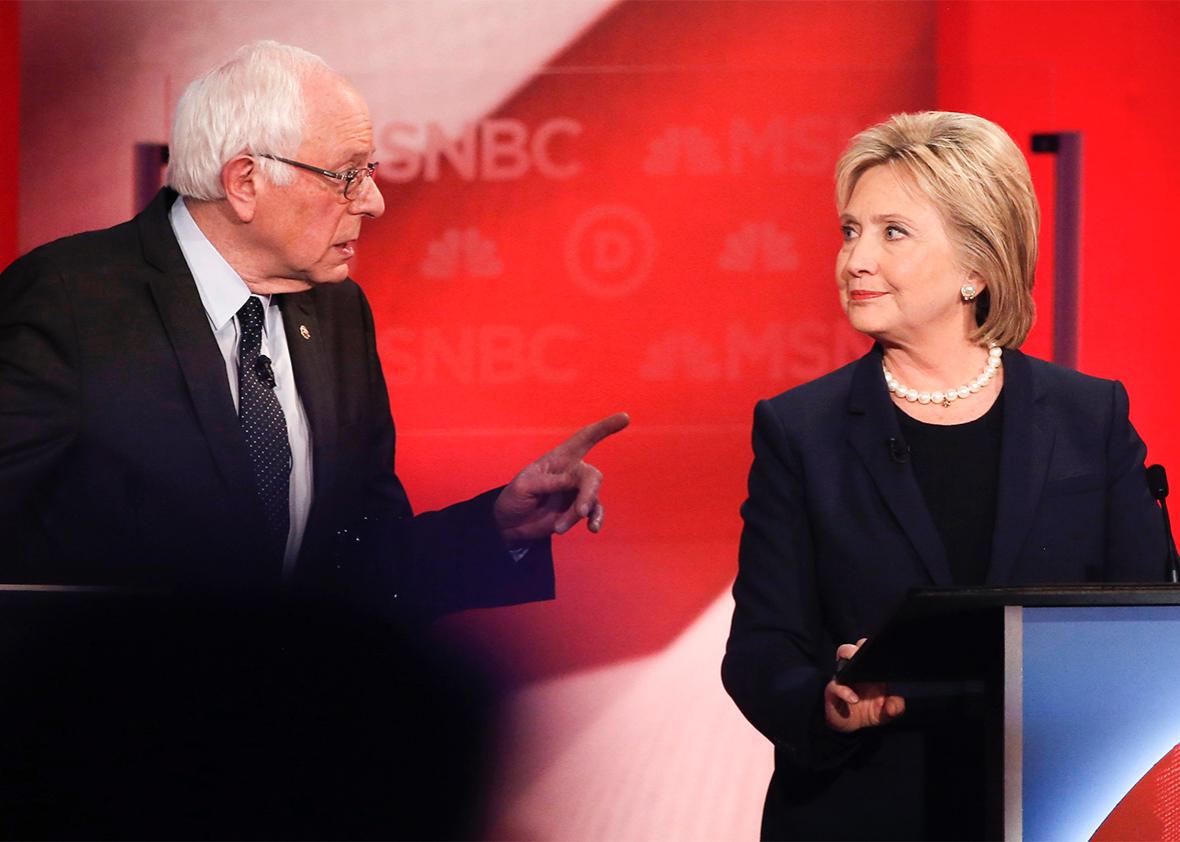Going into Thursday night’s Democratic presidential debate, pretty much everyone expected Vermont Sen. Bernie Sanders to criticize Hillary Clinton for accepting donations from Wall Street. And, indeed, he eventually brought up the millions of dollars her super PAC has collected, in part from donors in finance.
So, how’d she respond? In part, by criticizing Sanders for supporting a bill her own husband, former President Bill Clinton, signed into law. And weirdly, it was kind of effective.
Clinton started off by taking umbrage at Sanders’ “insinuation” that “anybody who ever took donations or speaking fees from any interest group has to be bought.” Which, all right, fine. “You will not find that I ever changed a view or a vote because of any donation that I ever received,” she added. Which, again, all right, fine. But then she moved onto a more interesting point:
While we’re talking about votes, you’re the one who voted to deregulate swaps and derivatives in 2000, which contributed to the overleveraging of Lehman Brothers which was one of the culprits that brought down the economy. I’m not impugning your motive because you voted to deregulate swaps and derivatives. I’m not saying you did it for any financial advantage. What we’ve got to do as Democrats is to be united to actually solve these problems and what I believe is I have a better track record and a better opportunity to actually get that job done.
What Clinton is referring to here is Sanders’ 2000 vote in favor of the Commodity Futures Modernization Act, a bill that essentially banned the government from regulating derivatives, such as the credit default swaps that helped bring down the global economy during the financial crisis. The legislation gets talked about less often than the repeal of the banking regulation law Glass-Steagall, which Sanders opposed. (It’s also a law Sanders has said he would like to revive and Clinton would not). But it almost certainly played a far greater role in setting the stage for Wall Street’s meltdown.
In some ways, Clinton’s critique here is a bit unfair. The version of the bill that Sanders supported as a House member, while certainly deregulatory, wasn’t quite as extreme as the final version that was passed into law. It’s also a little discordant since, once again, her own husband signed the bill. (He’s since said it was a mistake.)
But fundamentally, it’s a fair retort. In Sanders’ view, Wall Street wins in Washington thanks to the corrupting power of money on politics. To some extent, that’s probably true. But it ignores the fact that sometimes, bad, industry-friendly ideas just become popular because they sound good at the time. In the late 1990s, there were lots of intelligent people on the center-left who thought deregulation was a legitimately brilliant idea. Deregulation was in the air and even Bernie Sanders, democratic socialist, wasn’t immune. Today, Democrats have changed their tune. And in Clinton’s view, ideas matter more than money.
Sanders, for his part, responded by talking once again about Glass-Steagall, which wasn’t particularly relevant.
Read more Slate coverage of the Democratic primary.
*Correction, Feb. 5, 2016: This post originally included a photo from the NBC debate on Jan. 17, 2016, in Charleston, South Carolina, but misidentified it as a photo from the MSNBC debate held at the University of New Hampshire in Durham, New Hampshire, on Feb. 4, 2016. The photo has been replaced.
